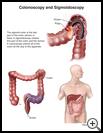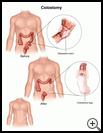
Cancer of the Colon
What is cancer of the colon?
Cancer of the colon is an abnormal growth of cells that forms tumors in a section of the large intestine called the colon. If the cancer spreads to other parts of the body, it is still colon cancer and is called metastatic colon cancer.
There are different types and stages of colon cancer based on what kind of cancer cells are found, where the tumor started, and where it has spread. Knowing your type and stage of colon cancer helps your healthcare provider decide on the best treatment plan for you. It is important to diagnose and treat colon cancer as soon as possible. The main goals of treatment are to kill the tumor cells, prevent a localized cancer from spreading, and prevent metastatic cancer from spreading more than it already has.
The combination of obesity, a diet high in fat and low in fiber, and a lack of exercise increase your risk for colon cancer. You may also have a higher risk for developing colon cancer if you or a family member has had colon polyps, you have inflammatory bowel disease, or you have had certain other kinds of cancer. Colon cancer usually occurs after age 50, but it can happen at any age.
What can I expect in the hospital?
Several things may be done while you are in the hospital to monitor, test, and treat your condition. They include:
Monitoring
- You will be checked often by the hospital staff.
- Your heart rate, blood pressure, and temperature will be checked regularly.
- Your blood oxygen level may be monitored by a sensor that is attached to your finger or earlobe.
Testing
You may have testing to confirm your cancer diagnosis. Other testing may be done to check to see if the cancer has spread to other parts of your body. Testing may include:
- Tests of bowel movements to check for blood
- Blood tests to check for blood loss and for certain hormones, proteins, or chemicals that may be high if you have cancer
- Sigmoidoscopy or colonoscopy: A long, thin, flexible tube and tiny camera is put into the rectum and up into the colon to look for polyps. A biopsy may be taken to help make a diagnosis. A biopsy is the removal of a small sample of tissue for testing.
- Computed tomography (CT) Scan: A series of X-rays is taken from different angles and arranged by a computer to show thin sections of the colon and other areas where the cancer may have spread.
- Barium enema: An X-ray is taken of the belly (abdomen) after a contrast barium is inserted through the rectum to show the walls of the intestine and any possible problems
- Magnetic resonance imaging (MRI): A powerful magnetic field and radio waves are used to take pictures from different angles to show thin sections of the colon and other areas where the cancer may have spread
- X-rays: Pictures of the inside of the abdomen, chest, and bones to check for cancer
- Positron emission tomography (PET) scan: A series of detailed pictures is taken after your healthcare provider injects a small amount of radioactive chemical into your blood. The scan shows active areas where the radioactive material is being absorbed.
Treatment
The treatment for colon cancer depends on the type and stage of the cancer. Treatment may include:
- You will have a small tube (IV catheter) inserted into a vein in your hand or arm. This will allow for medicine to be given directly into your blood and to give you fluids, if needed.
- You may receive oxygen through a small tube placed under your nose or through a mask placed over your face.
- You may have a tube put through your nose down into your stomach, called a nasogastric or NG tube. The tube may be used to give fluids or medicine, or with suction to help relieve pressure from air or fluids in the stomach and intestine.
- The tumor and any organs or parts of organs that are affected by the tumor may be removed with surgery. Surgery may include:
- Colon resection: Surgery to remove the section of colon that contains the cancer and then sew the ends of the intestine back together
- Colostomy: Surgery to remove a large section of the colon, and then attach a healthy part of the remaining colon to an opening in the wall of the abdomen. Bowel movements then pass through this opening instead of the rectum. They are collected in a bag outside the body. After the remaining colon heals, the colostomy can sometimes be closed. This means that you may need a second surgery to connect the ends of the colon to each other and will no longer have a colostomy.
- Lymph node dissection: Surgery to remove lymph nodes in the area of the bowel affected to check if the cancer has already spread. It also allows the pathologist to determine the stage of the cancer accurately. This will allow your healthcare providers to determine if you need more treatment after you recover from surgery.
- Other treatments may include:
- Chemotherapy (anticancer drugs) uses medicine to kill cancer cells
- Radiation therapy uses high-energy X-rays to kill cancer cells
- Your provider may prescribe medicine to:
- Treat pain
- Treat or prevent an infection
- Treat or prevent anemia, which means you don’t have enough red blood cells to carry oxygen to your body. Anemia may be caused by your cancer, your treatment, or other problems.
- Treat or prevent side effects, such as nausea or constipation, from other treatments
- Help your immune system fight cancer
- Your provider may recommend other types of therapy to help relieve pain, other symptoms, or side effects of treatment.
What can I do to help?
- You will need to tell your healthcare team if you have new or worsening:
- Changes in bowel habits, such as pain, mucus, diarrhea, constipation, or other intestinal problems
- Abdominal cramps or pain
- Nausea or vomiting
- Blood in bowel movement
- Redness, swelling, pain, warmth, or drainage from your surgical wound
- Fever, chills, or muscle aches
- Ask questions about any medicine or treatment or information that you do not understand.
How long will I be in the hospital?
How long you stay in the hospital depends on many factors, including the stage of your cancer and the treatment you need. The average amount of time to stay in the hospital after treatment for colon cancer is 6 to 9 days.
Last modified: 2016-10-13
Last reviewed: 2016-08-16




